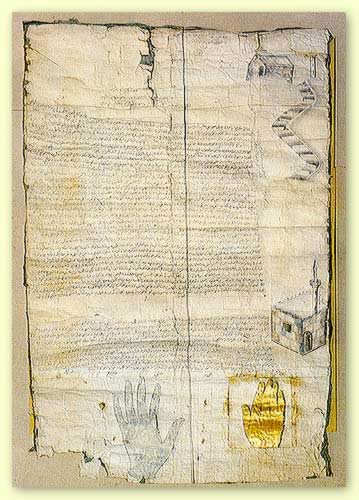PROPHET MUHAMMAD'S PROMISE TO CHRISTIANS
 St. Catherine's Monastery, Sinai, Egypt A Picture of Prophet Muhammad's Letter to St. Catherine's Monastery Muslims and Christians together constitute over fifty percent of the world and if they lived in peace, we will be half way to world peace. One small step that we can take towards fostering Muslim-Christian harmony is to tell and retell positive stories and abstain from mutual demonization. In this article I propose to remind both Muslims and Christians about a promise that Prophet Muhammed (pbuh) made to Christians. The knowledge of this promise can have enormous impact on Muslim conduct towards Christians. Muslims generally respect the precedent of their Prophet and try to practice it in their lives. In 628 AD, a delegation from St. Catherine’s Monastery came to Prophet Muhammed and requested his protection. He responded by granting them a charter of rights, which I reproduce below in its entirety. St. Catherine’s Monastery is located at the foot of Mt. Sinai and is the world’s oldest monastery. It possess a huge collection of Christian manuscripts, second only to the Vatican, and is a world heritage site. It also boasts the oldest collection of Christian icons. It is a treasure house of Christian history that has remained safe for 1400 years under Muslim protection.
The first and the final sentence of the charter are critical. They make the promise eternal and universal. Muhammed asserts that Muslims are with Christians near and far straight away rejecting any future attempts to limit the promise to St. Catherine alone. By ordering Muslims to obey it until the Day of Judgment the charter again undermines any future attempts to revoke the privileges. These rights are inalienable. Muhammed declared Christians, all of them, as his allies and he equated ill treatment of Christians with violating God’s covenant.
A remarkable aspect of the charter is that it imposes no conditions on Christians for enjoying its privileges. It is enough that they are Christians. They are not required to alter their beliefs, they do not have to make any payments and they do not have any obligations. This is a charter of rights without any duties! The document is not a modern human rights treaty but even thought it was penned in 628 A.D. it clearly protects the right to property, freedom of religion, freedom of work, and security of the person. I know most readers, must be thinking so what? Well the answer is simple. Those who seek to foster discord among Muslims and Christians focus on issues that divide and emphasize areas of conflict. But when resources such as Muhammad’s promise to Christians is invoked and highlighted it builds bridges. It inspires Muslims to rise above communal intolerance and engenders good will in Christians who might be nursing fear of Islam or Muslims. When I look at Islamic sources, I find in them unprecedented examples of religious tolerance and inclusiveness. They make me want to become a better person. I think the capacity to seek good and do good inheres in all of us. When we subdue this predisposition towards the good, we deny our fundamental humanity. In this holiday season, I hope all of us can find time to look for something positive and worthy of appreciation in the values, cultures and histories of other peoples.
References
|
A Aban ibn Said(ar) ‘Abbas ibn ‘Abd al-Muttalib Abbad ibn Bishr Abdu'l-Rahman ibn Abu Bakr Abd ar-Rahman ibn 'Awf Abdullah ibn Abu Aufa Abdullah ibn Abbas Abd-Allah ibn Abd-Allah ibn Ubayy 'Abd Allah ibn 'Amr ibn al-'As Abd Allah ibn al-Zubayr Abdullah ibn Hudhafah as-Sahmi Abdullah ibn Jahsh Abdullah ibn Mas`ud 'Abd Allah ibn Rawahah Abdullah ibn Salam `Abd Allah ibn `Umar Abdullah ibn Umm Maktum Abîd ibn Hamal(ar) Abîd ibn Hunay(ar) Abjr al-Muzni(ar) Abu al-Aas ibn al-Rabiah Abu Ayyub al-Ansari Abu Bakr Abu Dardaa Abû Dhar al-Ghifârî Abu Fuhayra Abu-Hudhayfah ibn Utbah Abu Hurairah Abu Lubaba ibn Abd al-Mundhir Abu Musa al-Ashari Abu Sa`id al-Khudri Abu Salama `Abd Allah ibn `Abd al-Asad Abu Sufyan ibn al-Harith Abu Sufyan ibn Harb Abu Ubaydah ibn al-Jarrah Abzâ al-Khuzâ`î(ar) Adhayna ibn al-Hârith(ar) Adî ibn Hâtim at-Tâî Aflah ibn Abî Qays(ar) Ahmad ibn Hafs(ar) ...
Comments
Post a Comment